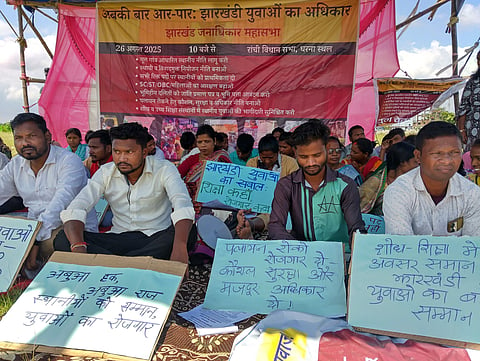
Ranchi- On August 26, several young men and women gathered under the banner of the Jharkhand Janadhikar Mahasabha (JJM) in Ranchi to stage a dharna, voicing their demands for a permanent employment policy, priority for local youth in jobs, and better education systems free from corruption.
The protest, initially planned as a gherao of the Jharkhand Legislative Assembly on August 5, was postponed due to the demise of JMM stalwart and former Chief Minister Shibu Soren. Despite the setback, the youth regrouped and held a peaceful demonstration to press their demands, highlighting the state's failure to address unemployment, education, and migration issues. The protesters, representing the frustrations of Jharkhand’s youth, called for immediate action to secure their future and preserve their identity.
Jharkhand, formed 24 years ago, continues to grapple with systemic issues of unemployment, poor education infrastructure, and forced migration. The JJM, a platform advocating for the rights of Jharkhand’s people, has been at the forefront of mobilizing youth to demand accountability from the government. The protesters criticized the persistence of the anti-people local policy introduced by the Raghubar Das government, which remains unchanged even after six years of the Hemant Soren-led administration. The youth expressed their anguish over the lack of job opportunities, the dismal state of education, and the recurring issue of examination paper leaks, which have shattered their hopes and aspirations.
The Jharkhand Janadhikar Mahasabha put forth a series of demands to address the grievances of the youth:
Permanent Employment Policy: A robust policy to ensure job opportunities for local youth.
Priority for Local Youth: 100% reservation for Jharkhand residents in government and private sector jobs to curb the dominance of outsiders.
Education-to-Employment Guarantee: Assurance that completing education leads to secure employment.
Jobs for Displaced Youth: Special employment schemes for tribal youth displaced due to mining activities.
Improved Education System: Recruitment of teachers and better infrastructure in rural schools to ensure quality education.
Transparency in Recruitment: Strict measures to prevent paper leaks and ensure fair hiring processes.
Land and Caste Certificates for Landless Dalits: Socio-economic justice through land allocation and certification.
Increased Reservation for SC/ST/OBC and Women: Strict implementation of reservation policies in education and jobs.
The dharna saw passionate participation from youth across Jharkhand, who shared their frustrations and experiences.
Shikha from Doranda, expressed despair over the plight of educated youth: “Many students, despite completing their B.Ed. degrees, remain unemployed. The government’s promises of jobs have gone unfulfilled.”
Deepak Ranjit accused the government of betrayal: “The Jharkhand government won elections on promises of addressing issues like employment policy and local rights. We supported them and helped form the government, but nothing has been done for the youth.”
Deepti Minj highlighted the migration crisis: “Vacancies are either delayed or marred by paper leaks. This forces migration, and our people face exploitation in other states.” Deepti further emphasized the plight of tribal youth: “Youth displaced by mining need jobs and opportunities. The looting of agricultural land threatens the tribal and Jharkhandi identity.”
Krishna Oraon from Latehar pointed to the education crisis: “Due to the lack of quality education in government schools, most rural youth are compelled to migrate in search of jobs.”
Nanhku Singh from Manika, Latehar, reminded the government of its promises: “The Hemant government pledged to fill vacant posts across departments if elected, but recruitment is still stalled.”
Geeta Devi from Chatra spoke about educational disparities: “Poor children lack access to quality education. Rural schools are far, and teachers are not recruited. Private schools offer better education, but poverty prevents us from enrolling our children, leading to their failure in competitive exams.
Jharkhand’s unemployment rate, which has crossed 17%, is three times the national average, pushing millions of youth to migrate to states like Delhi, Maharashtra, Gujarat, Tamil Nadu, Karnataka, Telangana, Andhra Pradesh, Punjab, and Kerala in search of livelihoods.
According to the Migrant Workers Cell, over 10 lakh Jharkhandis have migrated, facing exploitation, discrimination, inhumane working conditions, lower wages compared to local workers, and an identity crisis. The lack of a clear employment policy, coupled with land acquisition for mining and industrial projects, has stripped tribal communities of their agricultural lands, forcing them into low-paying, unstable jobs elsewhere.
The education system’s failures, including 7,900 primary schools with only one teacher and 17,850 vacant teacher posts, exacerbate the crisis. In higher education, over 4,000 posts remain unfilled, and the lack of SC/ST/OBC reservations is seen as systemic discrimination. In the private sector, only 21% of jobs go to Jharkhandis, despite a 75% reservation rule, further fueling discontent.
The recurring issue of examination paper leaks has further deepened the youth’s distrust in the system. The JSSC-CGL exams in January and September 2024 were canceled due to leaks, and despite demands for a CBI inquiry in the High Court, no concrete action has been taken. The recruitment process for excise constables was halted after changes in regulations, resulting in the tragic deaths of 12 candidates. Similarly, the Jharkhand Police Competitive Examination 2023, which advertised 4,919 posts, was withdrawn, wasting the efforts of thousands of aspirants. These failures, combined with unclear employment policies, have left the youth disillusioned with both the government and the system.
The JJM had initially planned a massive gherao of the Jharkhand Legislative Assembly on August 5, to press their demands. However, the sudden demise of Shibu Soren, a towering figure in Jharkhand’s political and tribal rights movement, on August 4, led to the postponement of the event. On August 26, the youth regrouped and held a dharna in Ranchi, submitting a memorandum to the authorities.
You can also join our WhatsApp group to get premium and selected news of The Mooknayak on WhatsApp. Click here to join the WhatsApp group.